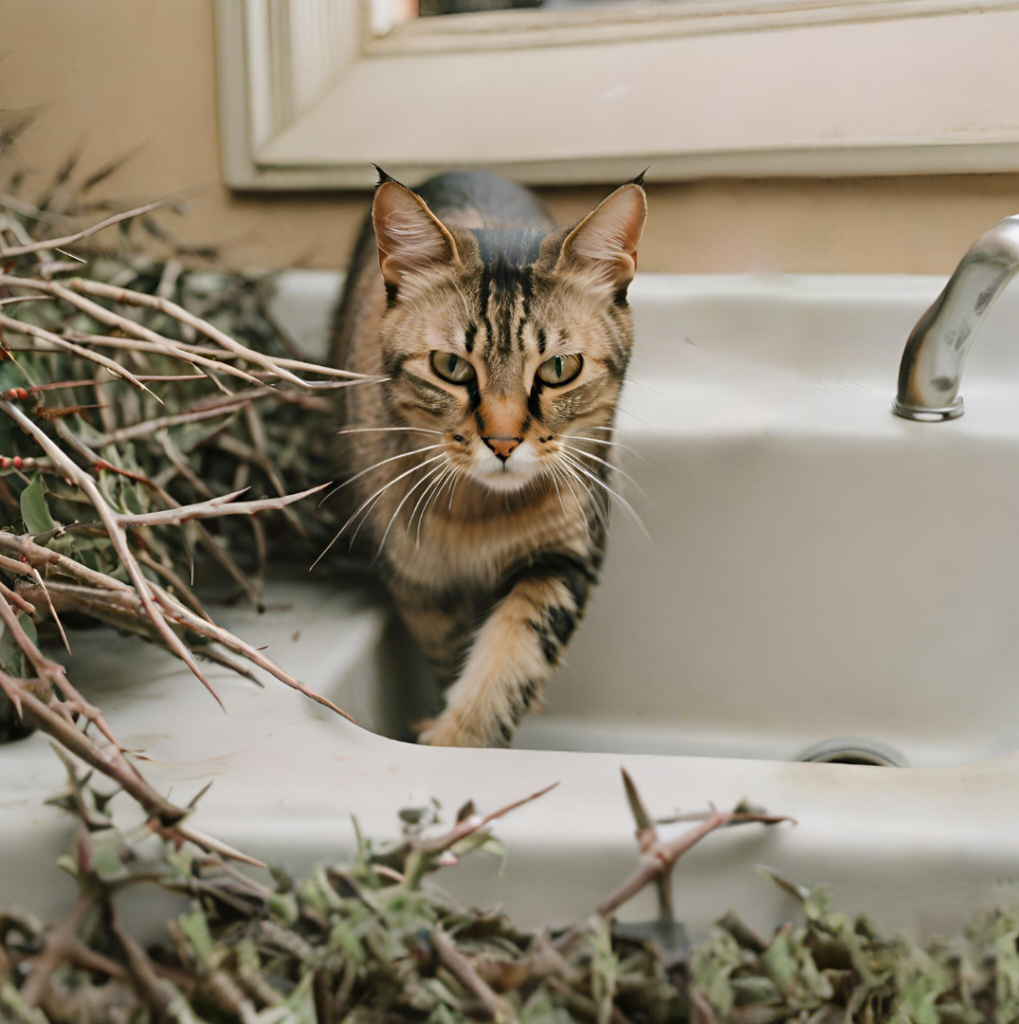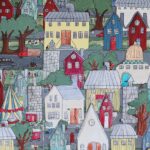Spiked
– Nonfiction by Angie Townsend –
Featured in issue 15 of Dreamers Magazine

The last of the black spikes have thwonked into the dumpster. They were hiding in the utility closet, between the kitty litter and the broken garden angel I can’t bear to throw out. I thought I’d ousted them all, but the sight of the last thatch made me jump.
Jumping was the entire point, of course. V. had amassed the thorns to train the kittens by way of trauma.
Betsy and Kanki were eight months old when we adopted them, equivalent to ten-year-old children. It was their vocation to play, and it was their inheritance to trust. Their past was chaotic but kind, a hoarding house of hairy lookalikes who had been loved.
They expected life to amaze them, and they were not disappointed. Sadistic squirrels did tai chi on the porch for their delight. A softhearted woman carried them like newborns and sang them Presbyterian hymns. Tubes of gelatinous poultry, squeezed directly into their mouths, proved the presence of the Holy Spirit.
And then there was the sink.
Kanki discovered it first, but he shared all good things with his sister. The kitchen sink was a revelation, a portal to another dimension, holy ground where hairy kittens could stomp their white feet to glorious wetness. It is a myth that all cats hate being wet. At least two little lions, with 3” toe hair and beards like gnomes, think heaven must be a splashing sunshower. But earth offers sinks, and sinks offer endless elation.
This caused V. endless consternation.
When I dared to ask why it was a problem for the cats to be wet, all the blood in his face dried up. “They are disgusting.” It was a statement of fact. “They will get everything wet.”
As our resident neurotic and pristine-leaning clean freak, I was confused. V. did not believe in washing his own hair. V. scolded me for washing the floor too often. V. was worried about moist cats? V. had a plan. V. would install deterrents. If the kittens approached the sink, judgment would come, and it would be swift. The Grand Inquisitor was a roll of black garden spikes, sharp enough to pierce a paw.
I’d never seen such a thing, but V. had brought a library of knowledge beyond my ken. He knew just where to find the spikes, and he purchased enough to landscape our condo. He then proceeded to do exactly that.
It started with the sink, surrounded by a menacing moat of custom-trimmed wrath. Black spears assaulted my eyes and Kanki’s paws. Washing coffee cups required choreography. The kittens took their thirst to the bathroom, and I secretly let Kanki roll in the tub after my shower.
But the military operation had only begun. Once V. enjoyed the success of keeping the kittens off the counter, his eyes were opened to the potential of spikes.
Soon, black armaments patrolled plants and doorways, couches and closets. The cats couldn’t scratch what they
couldn’t approach. I couldn’t puncture V.’s unassailable, edge-of-angry logic.
So the three meeker residents learned to step lightly, trained by memories of bitten toes. When I sleepily stepped on spikes in the night, they tore my strawberry-print socks and made me bleed, but V. had always doubted my “hysteria” over diabetic feet anyway. “You’re diabetic. You have feet. Your feet will be fine.”
If spikes were useful, unanimous spikes were better, so V. improved his system by hooking them together. Now, removing the spikes took a degree in urban planning. An impulsive mistake could uproot the entire architecture. Only V. could remove the spikes properly.
But even humbled paws can jump, and the cats and I learned new moves. I took photos of their sweet faces and posted them with poems on Instagram, rubbing aloe on the world outside. I learned to crop out the black on the borders. I remembered my steps even in the night.
I don’t doubt that V. genuinely loved the cats. He was touched and tortured by Betsy’s innocence. He researched ceramic bowls to be sure they had the best money could buy. He didn’t know what to do with his love for them, telling me one day that his affection had experienced a “growth spurt,” only to chase Kanki with the venom of a wolverine army for chewing a plant.
The cats accepted staccato sweetness, luxuriating in V.’s lap as much as mine. Kanki chirped for him when he was in the bathroom. Betsy buried her face in his hair.
I don’t doubt that V. genuinely loved me. But the vehicle was too large for him to steer. I was all wet paw prints and trust, hokey hymns and wonder, infuriating and earnest and extreme. I said too much and tried too hard and believed too many things. I was too attached to safety, a peace child pleading for soft shores.
I was docile until pierced, but I couldn’t stop bleeding. What could not be tamed had to be contained.
Our fights punctured the absurd. My new glasses were the wrong shape for my face. My mother was a dotard. I should not be working from home. I was rather indoorsy. I did not like cruises or fishing or sexual jokes or David Lynch’s many films featuring head trauma.
Dizzy but not alone, I leaned on the cats. Having mapped the spikes and prevailed, they commanded optimism. Obedient to their pain reflexes, they rebelled in joy, jousting milk rings and dragging my socks into their cat tree.
The cats and I laughed. We found balm. We built bomb shelters with blankets and psalms.
And when the bomb dropped and V. declared victory, we saw a world without war.
V. opened the cage, fully expecting the bird would remain. But I flew, a hairy kitten under each wing, and split the sky with a song too high for spikes. Before V. realized what he had done, he had his win. I had the cats.
I had a wonderful time slaying stegosauruses. Not a spike remained. The wet cats rained chirrups and cheer, rolling in the sink and sniffing the contraband couch. It took weeks before we all stopped high-stepping, trusting that our feet could land safely.
I’m still learning that it’s possible to land safely.
I’m still learning that I’m not a liability, even if I’m not very dry or docile. My eyes run with irresponsible tears, and I wear cat-eye glasses and the pale skin of the indoorsy. I feel and talk and pray and clean the floor more often than most. Most of the time, I find my footing.
Life is no longer booby-trapped. I am the girl who removes landmines, the lover who shelters broken angels. I have two trusting cats and one sturdy heart, and we walk safely by day and night.
About the Author – Angie Townsend

Angela Townsend is Development Director at Tabby’s Place: a Cat Sanctuary, where she bears witness to mercy for all beings. She has an M.Div. from Princeton Theological Seminary and B.A. from Vassar College. Her work appears or is forthcoming in Amethyst Review, Braided Way, Cagibi, Fathom Magazine, and Young Ravens Literary Review, among others. Angie loves life dearly.
Did you like this story by Angie Townsend? To see more like it, checkout our Nonfiction category.
Like reading print publications? Consider subscribing to the Dreamers Magazine!

2024 Micro Nonfiction Story Writing Contest Results
Congratulations to the winners of the 2024 Dreamers Micro Nonfiction Story Writing Contest, for nonfiction stories between 100-300 words.

2024 Place and Home Contest Results
Congratulations to the winners of the Dreamers 2024 Place and Home Contest, based on the theme of migration, place & home.